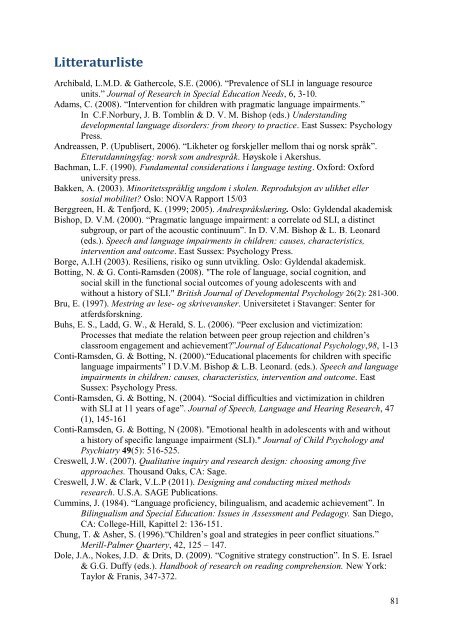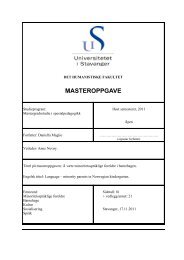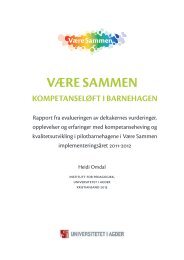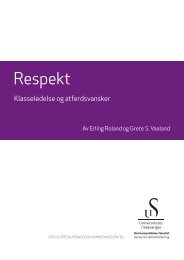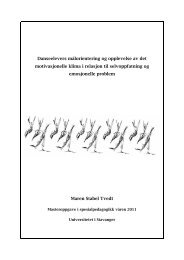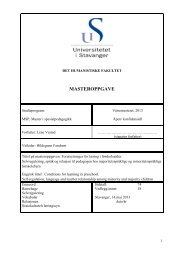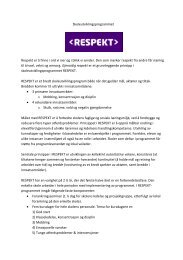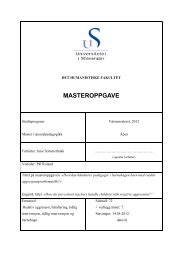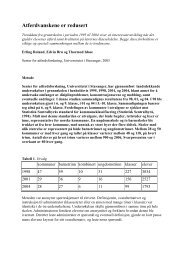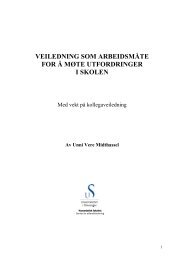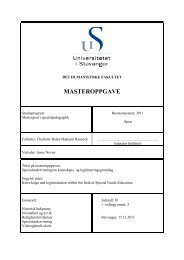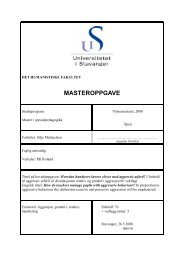Last ned Andressens masteroppgave - Universitetet i Stavanger
Last ned Andressens masteroppgave - Universitetet i Stavanger
Last ned Andressens masteroppgave - Universitetet i Stavanger
Create successful ePaper yourself
Turn your PDF publications into a flip-book with our unique Google optimized e-Paper software.
Litteraturliste<br />
Archibald, L.M.D. & Gathercole, S.E. (2006). “Prevalence of SLI in language resource<br />
units.” Journal of Research in Special Education Needs, 6, 3-10.<br />
Adams, C. (2008). “Intervention for children with pragmatic language impairments.”<br />
In C.F.Norbury, J. B. Tomblin & D. V. M. Bishop (eds.) Understanding<br />
developmental language disorders: from theory to practice. East Sussex: Psychology<br />
Press.<br />
Andreassen, P. (Upublisert, 2006). “Likheter og forskjeller mellom thai og norsk språk”.<br />
Etterutdanningsfag: norsk som andrespråk. Høyskole i Akershus.<br />
Bachman, L.F. (1990). Fundamental considerations i language testing. Oxford: Oxford<br />
university press.<br />
Bakken, A. (2003). Minoritetsspråklig ungdom i skolen. Reproduksjon av ulikhet eller<br />
sosial mobilitet? Oslo: NOVA Rapport 15/03<br />
Berggreen, H. & Tenfjord, K. (1999; 2005). Andrespråkslæring. Oslo: Gyldendal akademisk<br />
Bishop, D. V.M. (2000). “Pragmatic language impairment: a correlate od SLI, a distinct<br />
subgroup, or part of the acoustic continuum”. In D. V.M. Bishop & L. B. Leonard<br />
(eds.). Speech and language impairments in children: causes, characteristics,<br />
intervention and outcome. East Sussex: Psychology Press.<br />
Borge, A.I.H (2003). Resiliens, risiko og sunn utvikling. Oslo: Gyldendal akademisk.<br />
Botting, N. & G. Conti-Ramsden (2008). "The role of language, social cognition, and<br />
social skill in the functional social outcomes of young adolescents with and<br />
without a history of SLI." British Journal of Developmental Psychology 26(2): 281-300.<br />
Bru, E. (1997). Mestring av lese- og skrivevansker. <strong>Universitetet</strong> i <strong>Stavanger</strong>: Senter for<br />
atferdsforskning.<br />
Buhs, E. S., Ladd, G. W., & Herald, S. L. (2006). “Peer exclusion and victimization:<br />
Processes that mediate the relation between peer group rejection and children’s<br />
classroom engagement and achievement?”Journal of Educational Psychology,98, 1-13<br />
Conti-Ramsden, G. & Botting, N. (2000).“Educational placements for children with specific<br />
language impairments” I D.V.M. Bishop & L.B. Leonard. (eds.). Speech and language<br />
impairments in children: causes, characteristics, intervention and outcome. East<br />
Sussex: Psychology Press.<br />
Conti-Ramsden, G. & Botting, N. (2004). “Social difficulties and victimization in children<br />
with SLI at 11 years of age”. Journal of Speech, Language and Hearing Research, 47<br />
(1), 145-161<br />
Conti-Ramsden, G. & Botting, N (2008). "Emotional health in adolescents with and without<br />
a history of specific language impairment (SLI)." Journal of Child Psychology and<br />
Psychiatry 49(5): 516-525.<br />
Creswell, J.W. (2007). Qualitative inquiry and research design: choosing among five<br />
approaches. Thousand Oaks, CA: Sage.<br />
Creswell, J.W. & Clark, V.L.P (2011). Designing and conducting mixed methods<br />
research. U.S.A. SAGE Publications.<br />
Cummins, J. (1984). “Language proficiency, bilingualism, and academic achievement”. In<br />
Bilingualism and Special Education: Issues in Assessment and Pedagogy. San Diego,<br />
CA: College-Hill, Kapittel 2: 136-151.<br />
Chung, T. & Asher, S. (1996).“Children’s goal and strategies in peer conflict situations.”<br />
Merill-Palmer Quartery, 42, 125 – 147.<br />
Dole, J.A., Nokes, J.D. & Drits, D. (2009). “Cognitive strategy construction”. In S. E. Israel<br />
& G.G. Duffy (eds.). Handbook of research on reading comprehension. New York:<br />
Taylor & Franis, 347-372.<br />
81


